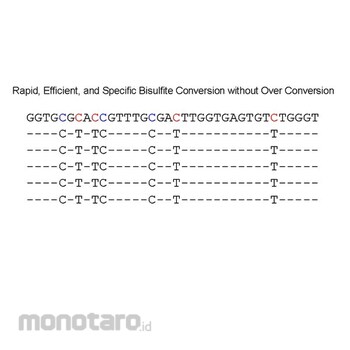Spesifikasi
| Material Size | 50 reactions |
|---|---|
| Quality Level | MQ100 |
Pilih jenis produk yang diinginkan
| Nomor SKU | Model Number | Masa Persiapan Barang | Harga | Jumlah |
|---|---|---|---|---|
| Loading... | ||||
Informasi Produk
Description
Methylation of cytosines located 5' to guanosine is known to have a profound effect on the expression of many eukaryotic genes. In normal cells methylation occurs predominantly in CG-poor regions, while CG-rich areas, called CpG-islands remain unmethylated. The exceptions are the extensive methylation of CpG islands associated with transcriptional inactivation of regulatory regions of imprinted genes and genes on the inactive X-chromosome of females. Aberrant methylation of normally unmethylated CpG islands has been documented as a relatively frequent event in immortalized and transformed cells and has been associated with transcriptional inactivation of defined tumor suppressor genes in human cancers.
Several methods have been developed to determine the methylation status of cytosine. These include the use of antibodies or protein methyl binding domains, digestion with methylation sensitive, insensitive, or dependent restriction enzymes as in restriction landmark genomic scanning (RLGS), oligonucleotide array hybridization, bisulfite genomic DNA sequencing and Methylation Specific PCR (MSP).
Genomic DNA sequencing, although time consuming and labor intensive, offers a more universal detection method. MSP is an established technology for the monitoring of abnormal gene methylation in selected gene sequences. Utilizing small amounts of DNA, this procedure offers sensitive and specific detection of 5-methylcytosine in promoters. It is being exploited to define tumor suppressor gene function, and to provide a new strategy for early tumor detection by interrogating DNA derived from tissues and bodily fluids.
The initial step of both bisulfite genomic sequencing and MSP is to perform a bisulfite modification of the DNA sample. In the bisulfite reaction, all unmethylated cytosines are deaminated and sulfonated, converting them to uracils, while 5-methylcytosines remain unaltered. Thus, the sequence of the treated DNA will differ depending on whether the DNA is originally methylated or unmethylated. Also, the initially complementary DNA strands will no longer be complementary after cytosine conversion. Primers for use in MSP can be designed to specifically amplify either a bisulfite-sensitive, unmethylated strand or a bisulfite-resistant, methylated strand, based upon these chemically-induced differences. Millipore offers a selection of CpG Wiz MSP kits to enable gene-specific analysis by MSP. To learn more about CpG Wiz kits and MSP technology Click here
Several methods have been developed to determine the methylation status of cytosine. These include the use of antibodies or protein methyl binding domains, digestion with methylation sensitive, insensitive, or dependent restriction enzymes as in restriction landmark genomic scanning (RLGS), oligonucleotide array hybridization, bisulfite genomic DNA sequencing and Methylation Specific PCR (MSP).
Genomic DNA sequencing, although time consuming and labor intensive, offers a more universal detection method. MSP is an established technology for the monitoring of abnormal gene methylation in selected gene sequences. Utilizing small amounts of DNA, this procedure offers sensitive and specific detection of 5-methylcytosine in promoters. It is being exploited to define tumor suppressor gene function, and to provide a new strategy for early tumor detection by interrogating DNA derived from tissues and bodily fluids.
The initial step of both bisulfite genomic sequencing and MSP is to perform a bisulfite modification of the DNA sample. In the bisulfite reaction, all unmethylated cytosines are deaminated and sulfonated, converting them to uracils, while 5-methylcytosines remain unaltered. Thus, the sequence of the treated DNA will differ depending on whether the DNA is originally methylated or unmethylated. Also, the initially complementary DNA strands will no longer be complementary after cytosine conversion. Primers for use in MSP can be designed to specifically amplify either a bisulfite-sensitive, unmethylated strand or a bisulfite-resistant, methylated strand, based upon these chemically-induced differences. Millipore offers a selection of CpG Wiz MSP kits to enable gene-specific analysis by MSP. To learn more about CpG Wiz kits and MSP technology Click here
Feature
Application : The CpGenome Turbo Bisulfite Modification Kit is designed to simplify & streamline the bisulfite modification process. In just 90 minutes go from DNA sample to bisulfite converted DNA ready for analysis.
Ulasan Produk
Tidak ada ulasan






















































































































































